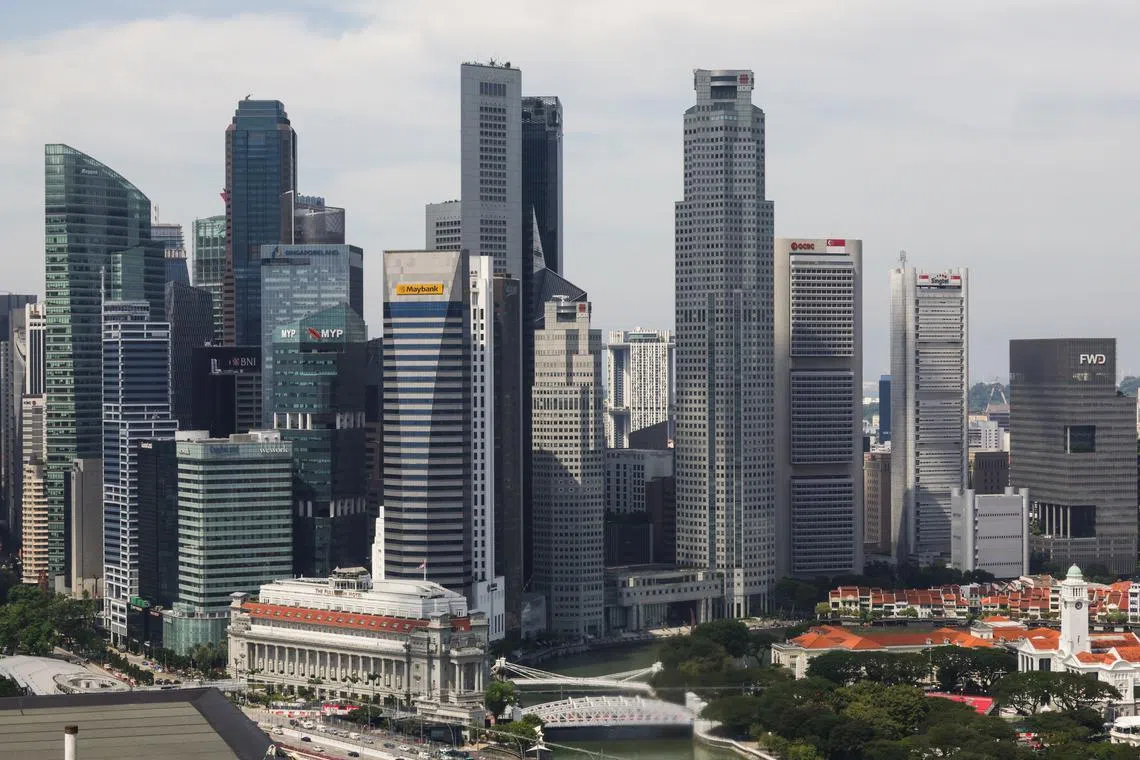New grant helping companies with climate reporting to launch in November
Sign up now: Get ST's newsletters delivered to your inbox

It is mandatory for all listed companies in Singapore to submit climate-related disclosures starting from FY2025.
ST PHOTO: GIN TAY
SINGAPORE - Large companies and small and medium-sized enterprises (SMEs) will receive help to produce their first climate-related sustainability reports from Nov 1.
Enterprises with 30 per cent of local shareholding can apply via Enterprise Singapore (EnterpriseSG) at enterprisesg.gov.sg/srg edb.gov.sg/en/grants/incentives-and-schemes.html.
Previously announced in March, the Sustainability Reporting Grant will help large companies with annual revenues of at least $100 million and above to develop their first International Sustainability Standards Board-aligned sustainability report. The grant defrays up to 30 per cent of qualifying costs, which include manpower training and consultancy services, capped at $150,000.
It is mandatory for all listed companies in Singapore to submit climate-related disclosures starting from FY2025, and for large non-listed companies to make them by FY2027.
While it is not mandatory for local SMEs with annual revenues below $100 million to do climate reporting, those which want to prepare early to develop their first sustainability reports can also get help under the SME Sustainability Reporting Programme, said EnterpriseSG in its media release on Oct 21.
The agency said that under the programme, SMEs can work with any of the three service providers – Deloitte and Touche Business Advisory, Ernst and Young LLP, and RSM Singapore Risk Advisory – on advisory services that will support them in preparing their first sustainability reports at “cost-competitive rates”.
Those interested can apply through the consulting firms’ websites from Nov 1.
The advisory services for SMEs include data collection, material assessment and report drafting in line with international reporting frameworks Global Reporting Initiative or Task Force on Climate-Related Financial Disclosures.
Designed specifically for smaller enterprises, Deloitte’s programme “simplifies the complex landscape” of sustainability reporting, offering a custom approach that addresses both compliance and strategic growth, said the firm’s sustainability and climate assurance partner Josette Soh.
“SMEs can not only meet local regulatory requirements but also turn sustainability into a competitive advantage,” she added.
Meanwhile, RSM’s sustainability reporting package can provide the “necessary steps” for smaller enterprises to build a meaningful foundation in their practices and disclosures, said Mr Dennis Lee, partner and head of business consulting at RSM.
“This increases the transparency and visibility of their sustainability performance and improves the reliability and consistency of sustainability data across global supply chains,” he said.
EnterpriseSG will defray 70 per cent of eligible costs for SMEs that apply for support from Nov 1, 2024, to March 31, 2026; and 50 per cent for those that apply from April 1, 2026, to Oct 31, 2027.
Mr Geoffrey Yeo, assistant managing director for capabilities, urban systems and solutions at EnterpriseSG, said: “Climate disclosure is fast becoming a market expectation, with many businesses facing increasing pressure from stakeholders such as customers, investors and regulators to do so.”
He noted SMEs that prioritise sustainability reporting can also enjoy a “competitive advantage”, such as being enabled to secure contracts or sustaining business relationships.
The agency also launched its inaugural sustainability report on Oct 21, highlighting key initiatives that have benefited more than 4,000 enterprises.
Achievements in 2023 include catalysing more than $230 million of green loans towards sustainable developments and capitalising over $50 million of equity and private investment towards green start-ups.
Key initiatives helping enterprises become better stewards of resources in 2023 include launching 11 new sustainability standards to address industry needs and collaborating with the Carbon Disclosure Project on environmental disclosure programmes for SMEs.
In a bid to encourage more companies to adopt sustainable solutions, EnterpriseSG also extended the higher grant support level of 70 per cent for the Enterprise Development Grant-Sustainability to March 31, 2026.
The sustainability report also documented Singapore’s growing role in the carbon market.
There are more than 120 carbon services and trading firms today, from 70 in 2020.
To boost its own sustainability journey, the agency made changes such as setting office equipment on hibernation mode and retrofitting the office with water-saving features in the toilets and pantries. In 2021, the public sector set itself a 2030 target of reducing energy and water use


